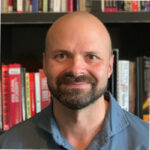The road to graduate education at the University of North Carolina at Chapel Hill looks different to each student who comes in pursuit of a higher degree. Cliff Keller is a Career Army Special Forces Officer at Fort Bragg. After serving in several deployments – from Afghanistan, to Kosovo and Latvia – and working for a U.S. Africa Command in Germany, Keller took on a new venture: a doctoral degree.

Through the United States Army, Keller decided to pursue Advanced Civil Schooling, in which the Army funds graduate education for soldiers so they can advance their career in a field related to their work in the military. Keller used this opportunity to pursue a degree in political science. He credits a curiosity in the field with the international issues the United States faces.
“The military is only one part of what we think about as a national power, or even how the United States relates to other countries. There’s this whole broad engagement that the U.S. is doing with partners and allies all over the world. Where do we fit into that?” Keller said. “I also focus on international conflict, and all the political processes and social processes that culminate in conflict but don’t start with conflict. How do we get to that?”
Alongside a partner at Fort Bragg, Keller began his doctoral studies in 2013 to help answer some of these questions. For his dissertation, Keller examined civil wars and the internal conflicts that sparked hostility. He also assessed the role outside countries play in civil wars and the vantage point they gain in doing so.
Keller’s service in numerous capacities in the military and overseas afforded him a unique perspective to his graduate work. At times, he’d have to divide the realistic from the theoretical while exploring the larger questions that pervade the field.
“My friend and I had life experiences you might think of as a practitioner view of a lot of the processes we were studying. We’re talking about civil wars, and I’ve seen that,” said Keller. “We had some perspectives that can be helpful, but also some that we had to overcome. We had to get out of our niche perspective of being a practitioner in conflict and look at it more analytically without the nuts and bolts of: ‘I know how this works in real life.’”
Keller graduated from Carolina in 2022 and still works for Army Special Operations Command at Fort Bragg. Using his background in political science, Keller works alongside colleagues to help answer questions plaguing our democracy. What will future conflicts look like? How are climate change and food insecurity going to change political and social dynamics? In exploring these issues, Keller looks back at the analytical frameworks he used as a student at UNC-Chapel Hill to help contextualize and navigate future problems.
—Kate Slate
